In this blog, Sreeram Vishnu discusses the policy response of Kerala State to combating the COVID-19 crisis in the farm sector. Embattled with a range of challenges, the State has formulated its own policies around multi-institutional interventions along with the inclusion of more functional components. Above all the central focus of the State’s policy is to achieve food self-reliance by augmenting domestic production.
CONTEXT
The response of the Government of Kerala to COVID-19 has largely been a success so far because of the strict disease containment measures and social security programmes it put in place, such as distribution of food kits though public distribution systems, functioning of community kitchens and various welfare measures intended for migrant workers (AESA Blog 109). However, the farm sector witnessed large scale disruptions due to the pandemic-induced lockdown in the agricultural supply chain – disturbing the harvesting, procurement and movement of various commodities. The state agricultural machinery tried to respond by beefing up the local procurement through various agencies, relaxing the lockdown norms for transport of commodities and agricultural operations in line with the directives of the Central Government, and by instituting novel initiatives such as ‘The pineapple challenge’ (AESA Field Note 4). Beyond these short-term measures, the State Government is contemplating a number of policy measures to tackle the crisis. These measures are informed by three critical factors:
- Consumerist status of the State and its pursuit of food self-reliance;
- Reverse migration of a large number of non-resident Keralites (NRKs);
- Revival of the farm sector derailed by the COVID-19 pandemic.
GOVERNMENT INTERVENTIONS
Jeevani Sanjeevani
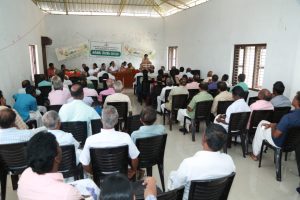 Inauguration of Jeevani programme at Ambalavayal Photo credit: Dhanya/DoAFE
Inauguration of Jeevani programme at Ambalavayal Photo credit: Dhanya/DoAFE
The Jeevani Sanjeevani project of the Agriculture Department is an ongoing initiative to boost vegetable cultivation (Box 1). Even though vegetable production in the State grew to 12.12 lakh tonnes in 2020 from 6.5 lakh tonnes in 2016, Kerala still depends on its neighbours for about 40 per cent of its total vegetable requirement (Kerala Karshakan 2020). Aggressive promotion of this project was the first response of the State towards combating the crisis in scaling up agricultural production. It envisaged a slew of measures to ramp up the local food production by promoting vegetable cultivation and facilitating its local-level marketing to strengthen the supply chain. However, with the risk of this pandemic looming large over the supply of other food commodities in the long run, the State started mulling over ways to attain food self-sufficiency. This concern was largely driven by the consumerist status of the State, with its heavy reliance on other states for food grains, vegetables and pulses. At present Kerala produces only 15 per cent of its total food grain requirement, domestically (Economic Review 2017).
Box 1. Objectives envisaged under the Jeevani Sanjeevani Project
|
Meanwhile the State is facing a new set of challenges – the huge influx of non-resident Keralites (NRKs), mostly from Gulf countries back to the State, and scarcity of manpower and machinery due to disruptions in the supply chain. Finding alternate livelihood avenues for the NRKs has become a daunting challenge for the State. Above all, interruptions in farming operations due to labour shortage is also expected in the post-COVID phase as migrant labourers have returned to their native states.
In this backdrop, the State Agriculture Department, after having grasped the gravity of the crisis, has redefined its policy response.
Subikhsa Keralam
A special drive, Subiksha Keralam (food sufficient Kerala) was launched by the State, to enhance domestic food production and attain food self-reliance to the extent possible (Government of Kerala 2020). The drive is envisaged as an intensive effort with the active involvement of different line departments, such as the Agriculture, Animal Husbandry, Industries, Fisheries, Water Resources, and Cooperative departments, Local Self-Government Institutions (LSGI) as well as agriculture, veterinary and fishery universities (Table 1).
In addition to the set of activities envisaged under the Jeevani Sanjeevani project, this initiative envisions a number of components, such as formulating local level production plans under the panchayat institution, strengthening farm mechanization and promotion of custom hiring services, facilitating procurement, minimal processing and value addition of produce by employing the infrastructural facilities of farm universities and training, consultancy services, and handholding support to small scale producers, NRKs, youth clubs and farmer collectives. A multi-mode awareness campaign was also planned under this special drive so as to create public awareness on the importance of ‘food self-reliance of Kerala’. Moreover, the drive assumes significance as the food crops accounted for a mere 10.12 per cent of the total cropped area in the State and an area of 1.09 lakh ha remaining as fallow (Department of Agriculture, Kerala 2020).
The State Agriculture Department have also set explicit objectives under this special initiative. These include campaign mode activities to promote farming in collaboration with the LSGIs, target-based expansion of area under fallow land cultivation, promotion of intercropping, distribution of seeds and planting materials of fruit crops, homestead cultivation, localized procurement of food crops, increasing the coverage of crops under irrigation, and strengthening agro service centers with the participation of multiple institutions and people’s cooperation. The scheme guidelines of the department are specific and target-based for each of the components. For instance, the additional area to be covered under fallow land cultivation of various food crops is fixed at 12,500 ha at the State level, with district specific area targets. It also mandates that at least 25 per cent of the beneficiary farmers should be youth.
Thus various institutions are supposed to complement other actors to achieve the objectives set under the Subiksha Keralam initiative. Coordination committees have also been formed at various levels to facilitate joint actions by different departments and institutions. Local level production plans are to be formulated to augment agricultural or allied sector production by the LSGIs by allocating additional funds meant for annual plan projects or by modifying the projects by integrating additional components to enhance farm production. In Kerala, about 25 per cent of the State’s annual plan funding devolves to local governments as development funds on an average, with the mandatory allocation of 30 per cent of this fund for productive sector (Economic Review 2017). Therefore the proposal is to streamline a portion of this fund to be spent for the activities planned under this special drive.
Table 1: Objectives and activities conceived under Subhiksha Keralam, a special drive by Kerala Agricultural University
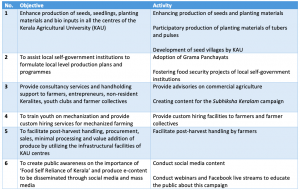
Reorienting the MGNREGA workers for fallow land farming activities, adequate supply of quality farm inputs, provision of subsidies, enhancing coverage of crops under crop insurance, smooth disbursal of loans through agricultural cooperatives even to landless tenants are some of the measures recommended to support farming activities. A dedicated portal was set up (www.aims.kerala.gov.in/subhikshakeralam) for gathering the details of various stakeholders interested in taking up farming activities under the special drive, to offer technical information support, and efficient and timely disbursal of subsidies to beneficiaries. Further, a State wide e-platform has been conceived and piloted under the initiative, to create an efficient market linkage for local produce, by roping in innovative agri-tech startups.
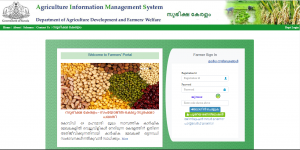
CONCLUSIONS
There is no denial that COVID-19 has led to massive and lasting disruptions in the farm sector. But response of the State to such a grave situation is crucial in tackling the crisis. Kerala State has redefined its policy measures to combat multiple challenges through dedicated interventions. Multi institutional collaborative action – to be led by the LSGIs – has been conceived with the launch of an intensive drive to achieve food self-reliance. However, realizing these partnerships and implementing planned activities at the ground level is going to be a real challenge.
The special drive presumes that KAU and KVKs will play a proactive role in reviving the agricultural supply chain of the State by adopting technology-led interventions. The extension machinery of these institutions may have to shoulder a variety of roles, such as vigorous campaigns to promote the special drive, facilitating partnerships, assisting the local self-government organizations in developing farm plans and production protocols, instituting market linkages, training youth in the areas of farm mechanization and agri-business ventures, and providing hand holding support for first time farmers in farming-related enterprises or for developing bankable projects.
However, capacitating the work force of the Agriculture Department and ATMA functionaries to take up additional responsibilities will be another challenge at this juncture. Ensuring meaningful engagement of various departments in plan formulation at the panchayat level, integration of new project components under Subhiksha Keralam with the existing plan projects, dealing with time constraints while executing the planned activities amidst the ongoing kharif cropping season and other regular schemes are some of the major challenges.
Moreover, interventions like fallow land farming or development of seed villages and community nurseries may require mobilization of farmer groups, youth clubs and women’s collectives. The strong presence of community-based organizations like Kudumbashree at the grassroots level, may augur well for the State in realizing these action plans. Though the policy response of the State was quick with a concrete plan of actions, its success can only be gauged against the attainment of goals, including enhanced farm production, area expansion under food crops, and generating more employment opportunities along the agricultural supply chain.
References
Agricultural Extension in South Asia. Blog 109 (2020). Combating COVID-19 and its impact on agriculture in Kerala: Significance of government support and community action. Retrieved from https://www.aesanetwork.org/blog-109-combating-covid-19-and-its-impact-on-agriculture-in-kerala-significance-of-government-support-and-community-action/
Agricultural Extension in South Asia. Field Note 4 (2020). Crisis management through agile Intervention – Helping pineapple growers in Kerala. Retrieved from https://www.aesanetwork.org/field-notes-4-crisis-management-through-agile-intervention-helping-pineapple-growers-in-kerala/
Department of Agriculture, Kerala (2020). Jeevani Project: A mitigation proposal for revitalizing agriculture in Kerala in the background of COVID-19.
Economic Review (2017). Decentralized planning. Kerala State Planning Board. Retrieved from http://spb.kerala.gov.in/ER2017/web_e/ch61.php?id=6&ch=61
Kerala Agricultural University. (2020). Special Drive programme of Kerala Agricultural University to support Subhiksha Keralam (Annexure 1).
Kerala Karshakan. (February, 2020). Jeevaniyiloode Jeevanam. Farm Information Bureau, Government of Kerala.
Government of Kerala. 2020. Subhiksha Keralam- Guidelines for increasing food production. Retrieved from https://go.lsgkerala.gov.in/files/go20200518_26136.pdf

Dr Sreeram Vishnu, Assistant Professor (Agricultural Extension), Regional Agricultural Research Station (RARS), Ambalayavayal, Wayanad, Kerala (sreeram.vishnu@kau.in).

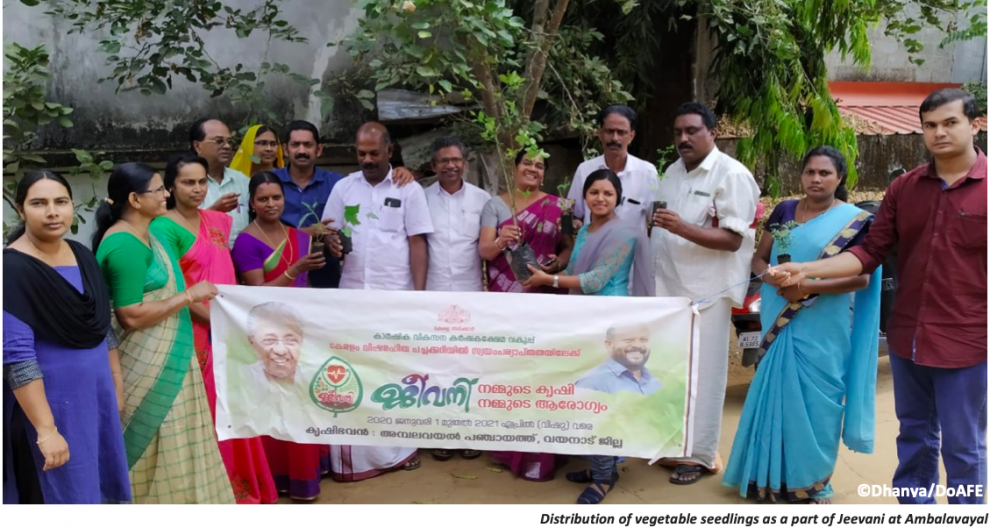

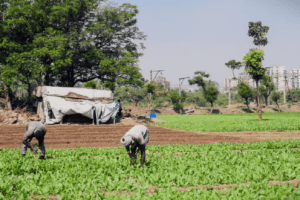

Very timely attempt to articulate the gravity of the problems of the farm sector in Kerala and describe the details of the policy response, planned actions and responsibility of multitude of institutions at all levels to implement actions for realizing the short term goal of addressing COVID 19 pandemic and long term goal of Food Self-Reliant Kerala. The author rightly concludes that the success of quick and brilliant policy and an incredible action plan to realize the short and long term goals depends on faithful implementation of planned policy and action points at the site level to establish a strong supply chain.
Congratulations!